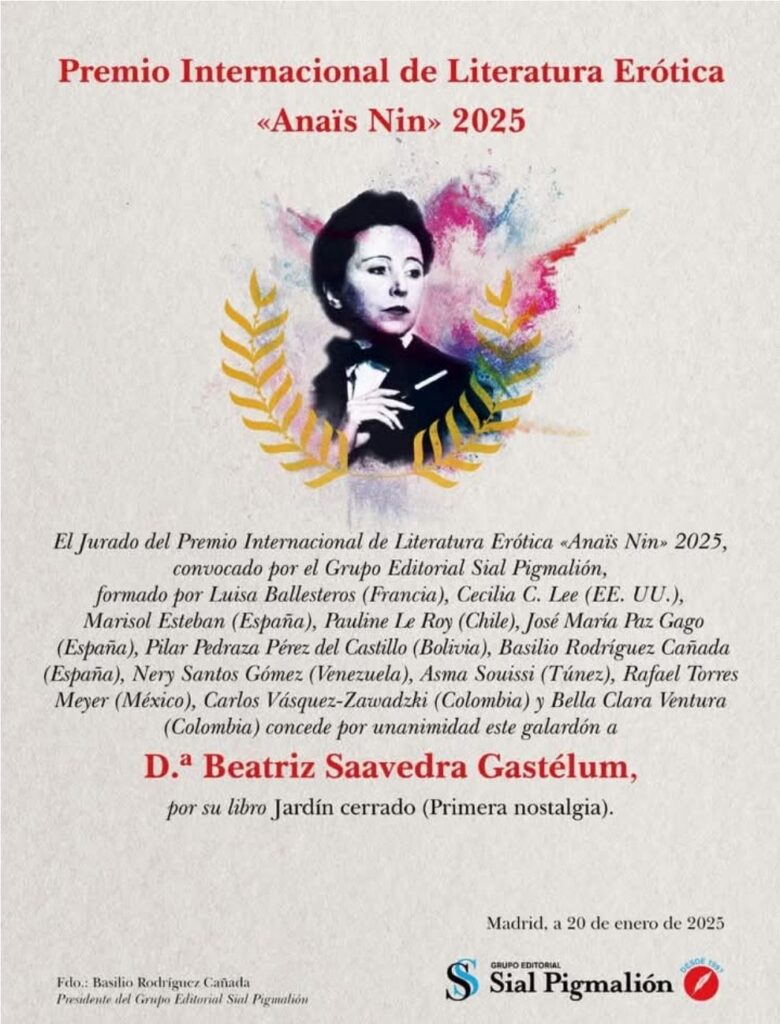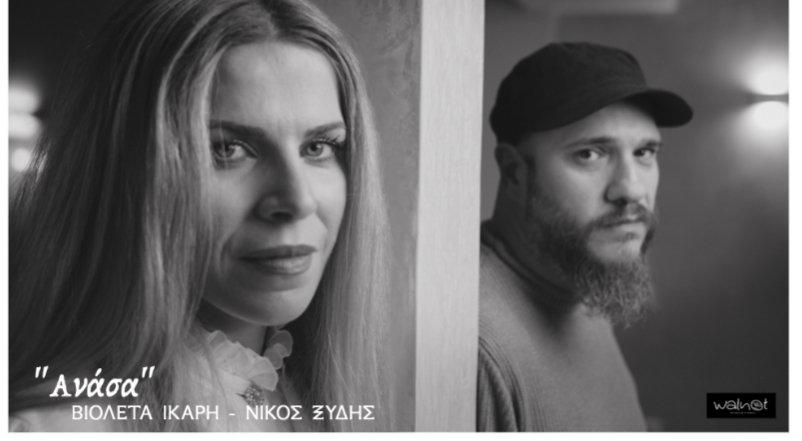Επιμέλεια: Εύα Πετροπούλου Λιανού
The Anaïs Nin International Prize for Erotic Literature, created in 2019 by the Sial Pigmalión Publishing Group, has announced its 2025 edition, recognizing Beatriz Saavedra Gastélum for her book Jardín cerrado (Primera nostalgia).
Beatriz Saavedra Gastélum (Mexican) has published twenty-four books of poetry and three books of essays.
Her work has been included in a large number of anthologies, magazines and newspapers both nationally and abroad; her poems have been translated into indigenous languages, French, English, Greek, Italian, Chinese, Arabic, Korean and German. She has received multiple awards, including the Cesar Vallejo Award for Cultural Excellence, an exemplary Sinaloa native in the world, finalist for the Prix Mallarme (France), the Serguei Pavlovich Korolev medal (Russia, 2023), the Alejandra Pizarnik International Literature Prize (Spain 2024, the Grand Cross of Honor of the National Legion of Mexico, the Letterarie Art Award: Il Canto di Dafne (Italy) and the Ricardo Flores Magón 2024 Mexico Journalism Award. Currently, she writes a cultural column in the Diario de Madrid and in the newspaper El Capitalino in Mexico. She presents “Poéticas de la inteligencia” at the IMER. She directs the literary creation workshop at the Capilla Alfonsina (INBAL) and the Cycle Alfonso Reyes and the women of his time. At the Ateneo Español she directs the cycle: Alfonso Reyes: Exile and the word, at the Museum of Women (UNAM), she coordinates the Cycle Poéticas de la intelligence and poetry in the voice of its authors, she is the creator and director of the International Festival Women in Letters of the National Academy of History and Geography (UNAM), she is co-director of the publishing house Floricanto A.C. President of the National Academy of Gender Perspective of the National Legion of Honor of Mexico.

Closed Garden (First Nostalgia)
In Closed Garden (First Nostalgia), Beatriz Saavedra explores the great enigmas of human existence through deeply introspective and philosophical poetry. With a lyrical voice that distills essential questions about life, love and mortality, the author traces an emotional map that crosses the labyrinths of memory, the landscapes of solitude and the borders of knowledge.
The book delves into the fragility of being and the inevitability of the transience of things, opening a space for reflection where the search for knowledge and truth emerge as a vital act. Through sensory images and powerful metaphors, Saavedra uses elements of nature, such as gardens, mirrors, and light, to symbolize the soul’s search in its attempt to understand the essence of reality and achieve transcendence.
Love, especially unrequited love, stands as a fundamental driving force that drives restlessness and deep questions about the purpose and reason for being. In this constant search for meaning, the poet suggests that only through poetic language and philosophical contemplation can one find refuge from the uncertainty of existence; love, presented as an enigma, is the guiding thread of the work. The verses delve into the complex nature of desire, memory, and loss, shaping a vision of love as a driver of fundamental searches and questions. As the author says: “Your body is the oblivion that endures in memory,” showing how love is capable of leaving indelible marks on subjectivity.
Time, another central axis, is explored as an inevitable flow that shapes our perception of life, but also allows for introspection and reflection on memory and becoming. The poems address the passage of time as a constant presence, “There is no after in oblivion,” but also as a space to find answers or accept the uncertainty inherent to existence.
Closed Garden is a book that invites the reader on an intimate and reflective journey, a tour of the vast territories of human consciousness, where poetry becomes a shining mirror that reflects the mysteries of the spirit, knowing that amidst the shadows and fragility of life, the poetic word can open paths to a deeper truth, a predestined light capable of illuminating even the darkest nights.



































